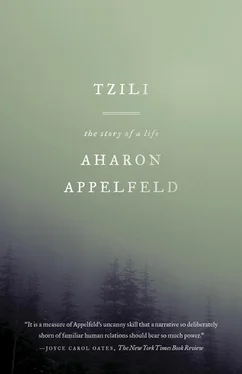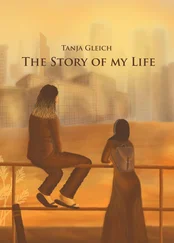That same night the soldiers invaded the town and destroyed it. A terrible wailing rose into the air. But Tzili, for some reason, escaped unharmed. Perhaps they didn’t see her. She lay in the yard, among the barrels in the shed, covered with sacking. She knew that she had to look after the house, but her fear stopped her from doing so. Secretly she hoped for the sound of a familiar voice coming to call her. The air was full of loud screams, barks, and shots. In her fear she repeated the words she had been taught by the old man, over and over again. The mumbled words calmed her and she fell asleep.
She slept for a long time. When she woke it was night and everything was completely still. She poked her head out of the sacking, and the night sky appeared through the cracks in the roof of the shed. She lifted the upper half of her body, propping herself up on her elbows. Her feet were numb with cold. She passed both hands over the round columns of her legs and rubbed them. A pain shot through her feet.
For a long time she lay supporting herself on her elbows, looking at the sky. And while she lay listening, her lips parted and mumbled:
“Before whom is he destined to stand in judgment?”
“Before the King of Kings, the Holy One blessed be He.”
The old man had insisted on the proper pronunciation of the words, and it was this insistence she remembered now.
But in the meantime the numbness left her legs, and she kicked away the sacking. She said to herself: I must get up, and she stood up. The shed was much higher than she was. It was made of rough planks and used to store wood, barrels, an old bathtub, and a few earthenware pots. No one but Tzili paid any attention to this old shed, but for her it was a hiding place. Now she felt a kind of intimacy with the abandoned objects lying in it.
For the first time she found herself under the open night sky. When she was a baby they would close the shutters very early, and later on, when she grew up, they never let her go outside in the dark. For the first time she touched the darkness with her fingers.
She turned right, into the open fields. The sky suddenly grew taller, and she was small next to the standing corn. For a long time she walked without turning her head. Afterward she stopped and listened to the rustle of the leaves. A light breeze blew and the cool darkness assuaged her thirst a little.
On either side stretched crowded cornfields, one plot next to the other, with here and there a fence. Once or twice she stumbled and fell but she immediately rose to her feet again. In the end she hitched her dress up and tucked it into her belt, and this immediately liberated her legs. From now on she walked easily.
For some reason she began to run. A memory invaded her and frightened her. The memory was so dim that after she ran a little way it disappeared. She resumed her previous pace.
Her oldest sister, who was preparing for examinations, was the worst of them all. When she was swotting, she would chase Tzili away without even lifting her head from her books. Tzili loved her sister and the harsh words hurt her. Once her sister had said: “Get out of my sight. I never want to see you again. You make me nervous.” Strange: these words rather than any others were the ones that seemed to carve themselves out of the darkness.
The darkness seeped slowly away. A few pale stripes appeared in the sky and turned a deeper pink. Tzili bent over to rub her feet and sat down. Unthinkingly she sank her teeth into a cornstalk. A stream of cool liquid washed her throat.
The light broke above her and poured onto her head. A few solitary animal cries drifted through the valley and a loud chorus of barks immediately rose to join them. She sat and listened. The distant sounds cradled her. Without thinking she fell asleep.
The sun warmed her body and she slept for many hours. When she woke she was bathed in sweat. She picked up her dress and shook off the grains of sand sticking to her skin. The sun caressed her limbs and for the first time she felt the sweet pain of being alone.
And while everything was still quiet and wrapped in shadows a shot pierced the air, followed by a sharp, interrupted scream. She bent down and covered her face. For a long time she did not lift her head. Now it seemed to her that something had happened to her body, in the region of the chest, but it was only a vague, hollow numbness after a day without eating.
The sun sank and Tzili saw her father lying on his bed. The last days at home, the rumors and the panic. Books and copybooks. No one showed any consideration for the feelings of his fellows. The examinations, which were to take place shortly in the distant town, threatened them all, especially her oldest sister. She tore out her hair in despair. Their mother too, in the shop, between one customer and the next, appeared to be repeating dates and formulas to herself. The truth was that she was angry. Only the sick father lay calmly in his bed. As if he had succeeded in steering the household onto the right course. He seemed to have forgotten his illness, perhaps even the dull presence of his youngest daughter. What he had failed to accomplish in his own life his children would accomplish for him: they would study. They would bring diplomas home.
And with these sights before her eyes she fell asleep.
WHEN SHE WOKE, her memory was empty and weightless. She rose and left the cornfield and made for the outskirts of the forest. As if to spite her, another picture rose before her eyes, it too from the last days at home. Her youngest brother was adamant: he had to have a bicycle — all his friends, even the poorest, had bicycles. All his mother’s pleas were in vain. She had no money. And what she had was not enough. Their father needed medicines. Tzili’s seventeen-year-old brother shouted so loudly in the shop that strangers came in to quiet him. The mother wept with rage. And the older sister, who did not leave her books for a moment, shrieked: because of her family she would fail her exams. Tzili now remembered with great clarity her sister’s white hand waving despairingly, as if she were drowning.
The day passed slowly, and visions of food no longer troubled her. She saw what was before her eyes: a thin forest and the golden calm of summer. All she had endured in the past days lost its terror. She was borne forward unthinkingly on a stream of light. Even when she washed her face in the river she felt no strangeness. As if it had always been her habit to do so.
And while she was standing there a rustle went through the field. At first she thought it was the rustle of the leaves, but she immediately realized her mistake: her nose picked up the scent of a man. Before she had time to recover she saw, right next to her, a man sitting on a little hillock.
“Who’s there?” said the man, without raising his voice.
“Me,” said Tzili, her usual reply to this question.
“Who do you belong to?” he asked, in the village way.
When she did not answer right away, the man raised his head and added: “What are you doing here?”
When she saw that the man was blind, she relaxed and said: “I came to see if the corn was ready for the harvesting.” She had often heard these words spoken in the shop. Since the same sentence, with slight variations, was repeated every season, it had become part of her memory.
“The corn came up nicely this year,” said the blind man, stroking his jacket. “Am I mistaken?”
“No father, you’re not mistaken.”
“How high is it?”
“As high as a man, or even higher.”
“The rains were plentiful,” said the blind man, and licked his lips.
His blind face went blank and he fell silent.
“What time is it?”
“Noon, father.”
He was wearing a coarse linen jacket and he was barefoot. He sat at his ease. The years of labor were evident in his sturdy shoulders. Now he was looking for a word to say, but the word evaded him. He licked his lips.
Читать дальше












